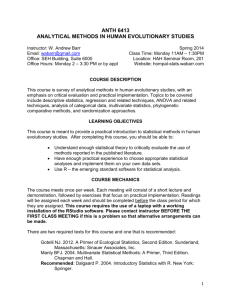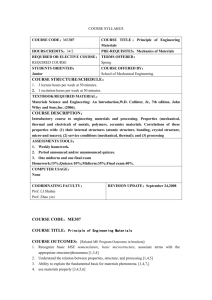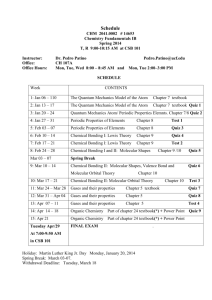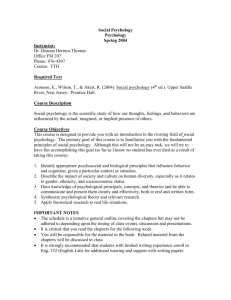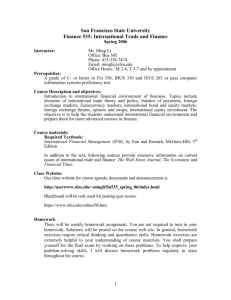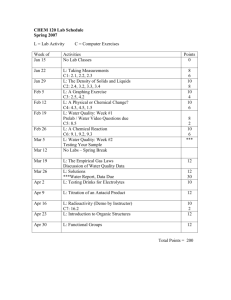KINE 383: Adapted Physical Activity/Therapeutic Recreation
advertisement
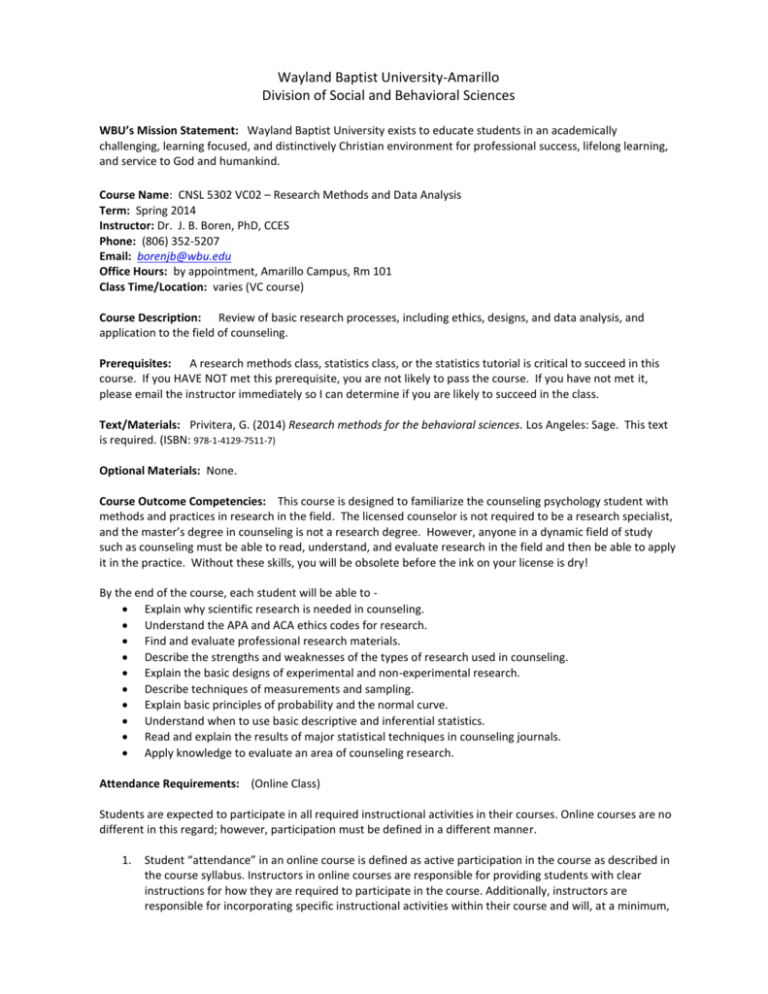
Wayland Baptist University-Amarillo Division of Social and Behavioral Sciences WBU’s Mission Statement: Wayland Baptist University exists to educate students in an academically challenging, learning focused, and distinctively Christian environment for professional success, lifelong learning, and service to God and humankind. Course Name: CNSL 5302 VC02 – Research Methods and Data Analysis Term: Spring 2014 Instructor: Dr. J. B. Boren, PhD, CCES Phone: (806) 352-5207 Email: borenjb@wbu.edu Office Hours: by appointment, Amarillo Campus, Rm 101 Class Time/Location: varies (VC course) Course Description: Review of basic research processes, including ethics, designs, and data analysis, and application to the field of counseling. Prerequisites: A research methods class, statistics class, or the statistics tutorial is critical to succeed in this course. If you HAVE NOT met this prerequisite, you are not likely to pass the course. If you have not met it, please email the instructor immediately so I can determine if you are likely to succeed in the class. Text/Materials: Privitera, G. (2014) Research methods for the behavioral sciences. Los Angeles: Sage. This text is required. (ISBN: 978-1-4129-7511-7) Optional Materials: None. Course Outcome Competencies: This course is designed to familiarize the counseling psychology student with methods and practices in research in the field. The licensed counselor is not required to be a research specialist, and the master’s degree in counseling is not a research degree. However, anyone in a dynamic field of study such as counseling must be able to read, understand, and evaluate research in the field and then be able to apply it in the practice. Without these skills, you will be obsolete before the ink on your license is dry! By the end of the course, each student will be able to Explain why scientific research is needed in counseling. Understand the APA and ACA ethics codes for research. Find and evaluate professional research materials. Describe the strengths and weaknesses of the types of research used in counseling. Explain the basic designs of experimental and non-experimental research. Describe techniques of measurements and sampling. Explain basic principles of probability and the normal curve. Understand when to use basic descriptive and inferential statistics. Read and explain the results of major statistical techniques in counseling journals. Apply knowledge to evaluate an area of counseling research. Attendance Requirements: (Online Class) Students are expected to participate in all required instructional activities in their courses. Online courses are no different in this regard; however, participation must be defined in a different manner. 1. Student “attendance” in an online course is defined as active participation in the course as described in the course syllabus. Instructors in online courses are responsible for providing students with clear instructions for how they are required to participate in the course. Additionally, instructors are responsible for incorporating specific instructional activities within their course and will, at a minimum, 2. 3. 4. have weekly mechanisms for documenting student participation. These mechanisms may include, but are not limited to, participating in a weekly discussion board, submitting/completing assignments in Blackboard, or communicating with the instructor. Students aware of necessary absences must inform the professor with as much advance notice as possible in order to make appropriate arrangements. Any student absent 25 percent or more of the online course, i.e., non-participatory during 3 or more weeks of an 11 week term, may receive an F for that course. Instructors may also file a Report of Unsatisfactory Progress for students with excessive non-participation. Any student who has not actively participated in an online class prior to the census date for any given term is considered a "no-show" and will be administratively withdrawn from the class without record. To be counted as actively participating, it is not sufficient to log in and view the course. The student must be submitting work as described in the course syllabus. Additional attendance and participation policies for each course, as defined by the instructor in the course syllabus, are considered a part of the university’s attendance policy. Disability Statement: In compliance with the Americans with Disabilities Act of 1990 (ADA), it is the policy of Wayland Baptist University that no otherwise qualified person with a disability be excluded from participation in, be denied the benefits of, or be subject to discrimination under any educational program or activity in the university. The coordinator of Counseling Services serves as the coordinator of students with a disability and should be contacted concerning accommodation requests at (806) 291-3765. Documentation of a disability must accompany any request for accommodations. Course Requirements and Grading Criteria: Grading: Assignments Discussion Board Course Project Quizzes Final Exam Total Grading Scale: A B C D F I W 200 pts. 200 pts. 200 pts. 300 pts. 100 pts. 1000 pts. 900 and above 800-899 700-799 600-699 599 and below Incomplete (given only in special circumstances; and only in last two weeks of course) Withdrawal (give to students who drop after the census date but before the deadline) A grade of incomplete is changed if the deficiency is made up by the middle of the next regular semester, otherwise it becomes an “F.” This grade is given only if circumstances beyond the student’s control prevented completion of work during the semester enrolled and attendance requirements have been met, and then only in the last two weeks of a class. For a student to be granted an “I” the instructor must file an incomplete report which details which work must be completed by the student and the deadline date for the completion. The incomplete report must be signed by the instructor and the student (exception for VC students in remote areas). Specific Requirements for the Online Student Compatible Computer and Access to Blackboard- You CANNOT take this course unless you can do the followingo Have regular access to a computer o Be able to log in to Blackboard o Be able to complete the assignments within Blackboard o Be able to rectify any software issues related to using Blackboard o o Be able to communicate with the instructor via email Know how to check to see if assignments have posted to Blackboard If you cannot do ALL of the above, for the duration of the course, you must immediately do one of the followingBorrow a friend’s computer to complete the above Find a public computer to complete the above Drop the course **Computer incompatability or software issues, or textbook inavailability is NOT an excuse for allowing make-ups on assignments!! ** Course Requirement Details Reading Assignments- Students will need to read along in the textbook and web-based materials. Assessment of student reading will come from student participation in posting materials in a timely manner, student performance on quizzes, and direct questioning from the instructor. While you may have gotten by in face-to-face courses with not reading, or sparsely reading your textbook, you will not survive an online course unless you read the text in some detail. Fair warning! Discussion Board- Several topics will be presented on the discussion board for student response. Some topics will seek simple answers to questions; others will seek student opinions on controversial or contemporary topics. Not everyone will agree on all issues, but everyone should be able to make an argument from principle and facts (as opposed to emotions) for each topic. Be respectful in the way you disagree. Remember, a discussion board leaves no room for non-verbal communication, so some methods you use in person (such as sarcasm, teasing, etc.) may be interpreted as insults. Please communicate as effectively as possible, and don’t be too quick to infer insult from someone else’s response to your post. Write your discussion board entries with the same care you would write a hard-copy to turn in for a grade. Do not use emoticons or other ‘chatroom’ slang…these will receive deductions in points. All of your writing in this course should be college-level and professional. The DB will comprise 20% of the course grade. Write your post by adding a new thread to each of the topical sections. Do not attempt to attach files…there are too many folks who won’t have compatible software to open them. If you ‘pre-write’ your paper in other software, copy-and-paste it into the Blackboard window, or re-type it there. Reply to previous postings by other students to add your comments to their posts. Do not be offended if other students do not agree with you. This is the place to put your opinions on these controversial subjects, but BE PREPARED to defend your opinions with facts. The instructor WILL CHALLENGE you if you post hearsay, myths, or other undocumented fallacies masquerading as facts. If you say “studies show” or “science has proven”, I will insist on supporting research…I’ll ask you to name those studies. Be prepared. One of my favorite quotes- “It ain’t what we don’t know that will hurt us…it’s what we know that ain’t so!” - Will Rogers And finally, have some fun and learn something with it!! Project- Each student will design (but not complete) a research project relating to the field of counseling psychology. The student should prepare a research prospectus which includes a formal hypothesis, statement of the problem, brief review of the literature, and a description of the sample group and how data would be collected, analyzed, and presented if the project were carried through to completion. The instructor will work with individual students throughout this process. Students must be able to communicate in a timely way…those who hesitate will find no time to complete the project! The project is worth 20% of the course grade. I will grade your final draft. I will keep count of the number of times you submit draft copies of each chapter (1, 2, or 3), but I won’t grade the submission of drafts. You are not required to submit drafts for editing, but doing so will likely result in a higher grade unless you are experienced at writing APA style papers. Important: Turning in a paper that was written for credit in a previous course, without attribution or permission from the instructor, is not acceptable college work (it is a form of plagiarism). Note on the Use of APA Style: School of Social and Behavioral Sciences policy requires the use of the APA style manual for all papers. This style manual should have been taught in previous (undergraduate) coursework; however, if you were not instructed in the proper use of APA style, you are responsible for learning it for this course. Either get an APA style manual (most college bookstores have them, as well as amazon.com, etc.), or get online and google ‘APA style’ and look at some of the free resources you find there. I will deduct points from all assignments which require APA style but are not written as such. (This would include primarily your project in this course.) Quizzes- Open-book, timed quizzes are given per unit and will cover material from each assigned chapter of the book. The purposes of the quizzes are to assure the instructor the reading material is being read as assigned and to determine the level of competence with each concept from the textbook. Quizzes which are missed (i.e., timed out) may not be made up. The student's grade on the final exam will be substituted for each missing quiz grade. If you miss no quizzes, you may waive the final exam. All quizzes must be completed on Blackboard by the due date. Quizzes will be unavailable after the due date, and cannot be made up. If you cannot take the quiz on the due date, make sure to take it early. The time allowed for each quiz is based on the length of the quiz. Most are ten to twenty minutes. If you have not read the chapter as assigned, you will have difficulty completing the quiz in the allotted time using the book. Once you start a quiz, you may not go back to it later. Finish it at that time. Students who wait until the last day/night before attempting a quiz are asking for trouble. If BlackBoard is down, or your computer crashes, or there’s a snowstorm and the power goes out, you will miss that quiz, and will then have to take the final! Start a day or two early!! Quizzes are 30% of the course grade. The quiz schedule always starts on a Tuesday and end on a Saturday (except the final). The quizzes become available at midnight Central Time and will time out (vanish) at 11:59 pm Central Time. Final Examination- A comprehensive final will be given. The final exam will be available for one week only…during the final scheduled week of the course. Please be sure to set your schedule so that you will have time available for the final exam. The final exam is 10% of the course grade. Again, if you miss no quizzes, you are allowed to waive the final examination (that means you don’t have to take it!). Email Account: As part of the basic requirements of this class, it is expected that every student will use their WBU email account. Email will be used by the instructor to disseminate information to students in such areas as general information, quizzes, and assignments. Further, it has been my experience that email provides a useful and convenient way for students to contact me with questions, comments, and/or concerns. Please use this means of communication to contact the instructor or any other students in the class. I prefer the email contact to phone contact, especially if you are notifying me of an absence. ACADEMIC HONESTY: The following is adapted from the School of Language and Literature’s Policy on plagiarism and academic dishonesty: Writing is a collaborative art. Discussion and collaborative brainstorming are good. However, passing off another's writing or ideas as your own is plagiarism. It is unethical, it constitutes Academic Dishonesty (cheating), and it is sufficient grounds both for failure of a course and suspension from the university. Plagiarism does not have to be intentional. One can commit plagiarism by accident. Common examples of plagiarism or academic dishonesty include the following: Copying any amount of text directly from an internet website, book, or other document without appropriate citation and synthesis into one’s own discussion. Paraphrasing the ideas presented in any source or oral discussion without appropriate citation. Using the evidence and conclusions of any source as the controlling framework for one’s own paper. Recycling work from a previous or concurrent course, even if it is your own work. Purchasing or otherwise downloading a paper from an internet website or other source. In some writing assignments, you will be expected to incorporate scholarly sources into your document. ALL OF THE FOLLOWING must be met to constitute appropriate citation of any source: Including MLA, Chicago, or APA parenthetical or note-style citation format as required by the instructor. Placing borrowed text directly from another source within “quotation marks.” Introducing clearly another author’s voice into the document by means of a signal phrase (an introduction of that author). Offering, in short, a clear distinction between one’s own voice or ideas and those of any outside authors brought into the discussion. Any suspected instance of academic dishonesty, including plagiarism, will first be evaluated by the instructor and discussed individually with the student. If the instructor determines that a student’s actions constitute Academic Dishonesty, the case will be reported to the university executive vice president/provost, as per university policy. Per university policy, second offenses RESULT IN SUSPENSION FROM THE UNIVERSITY. In this course, the first instance of Academic Dishonesty may also result in a zero on the assignment. Disclaimer: The instructor reserves the right to cancel, change, modify, rearrange or otherwise divert from this document, to make changes as I deem appropriate, or to change, without notice, any of the information or requirements if I deem such change to be appropriate, in the best interest of the class as a whole, or when necessary due to unforseen circumstances. This syllabus is not a contract, but a set of guidelines by which the class will operate. Course Outline: Week Unit 1 2 3 4 5 6 7 8 9 10 11 1 1 2 3 4 4 5 6 6 6 7 Topic/Readings Chapters 1, 2, 3 Chapters 4, 5 Chapters 6, 7 Chapter 8 Chapter 9 Chapter 10 Chapter 11 Chapter 12 Chapter 13 Chapter 14, 15 Final Exam/Project Due Bibliography: An extensive bibliography can be found starting on page 543 of the textbook. nd Alioto, A. M. (1993). A history of western science, 2 ed. Englewood Cliffs, NJ: Prentice Hall. Berry, W. D. (1993). Understanding regression assumptions. Sage Series on Quantitative Applications in the Social Sciences, vol. 92. Newbury Park: Sage Publications. Blake, R. M., Ducasse, C. J., Madden, E. H. (1960). Theories of scientific method: Renaissance through the nineteenth century. Seattle: Univ. of Washington Press. Clagett, M. (1969). Critical problems in the history of science. Madison, WI: Univ. of Wisconsin Press. Collyer, C. E., & Enns, J. T. (1987). Analysis of variance: The basic designs. Cresswell, J. (2005). Educational research: planning, conducting, and evaluating quantitative and qualitative nd research, 2 ed. Pearson: Upper Saddle River, NJ. Freund, R. J., & Wilson, W. J. (1993). Statistical methods. Boston: Academic Press, Inc. th Holcomb, Z. C. (2007). Interpreting basic statistics, 5 ed. Pyrczak Publishing: Glendale, CA. Iman, Ronald L. (1994). A data-based approach to statistics. Kirk, R. E. (1994). Experimental design: Procedures for the behavioral sciences, 3rd ed. Pacific Grove, CA: Brooks/Cole. Kleinbaum, D. G., Kupper, L. L., & Miller, K. E. (1988). Applied regression analysis and other multivariable methods, 2nd ed. Boston: PWS - Kent Publ. Co. Lentner, M., & Bishop, T. (1993). Experimental design and analysis, 2nd ed. Blacksburg, VA: Valley Book Co. Neter, J., Wasserman, W., & Kutner, M. H. (1990). Applied linear statistical models, 3rd ed. Homewood, IL: Irwin Press. th Patten, M. L. (2007). Understanding research methods, 6 ed. Pyrczak Publishing: Glendale, CA. Scheaffer, R. L., Mendenhall, W., & Ott, L. (1979). Elementary survey sampling, 2nd ed. North Scituate, MA: Duxbury Press. Spatz, C. ( 1993). Basic statistics: Tales of distributions, 5th ed. Pacific Grove, CA: Brooks/Cole Publishing Company. Weisberg, H. F. (1992). Central tendency and variability. Sage Series on Quantitative Applications in the Social Sciences, vol. 83. Newbury Park: Sage Publications. Condensed Assignment Checklist (By Unit) - CNSL 5302 VC02 Assignments will normally open at midnight CT on the available date and will close at 11:59 PM CT on the due date. Assignments WILL NOT be available for make-up after they close. Week Unit 1 1 2 3 2 4 3 5 6 7 8 9 10 11 4 5 6 7 Assignment Read chapters 1, 2, and 3 Homework 1 Quiz 1 (15 min.) Quiz 2 (20 min.) Quiz 3 (15 min.) Discussion Board 1 (Introduction) Discussion Board 2 (Background) Project- Start thinking about topics Read chapters 4, 5 and 6 Homework 2 Homework 3 Quiz 4 (15 min.) Quiz 5 (15 min.) Discussion Board 3 (Topic) Project- Get topic approved Read chapters 7 and 8 Homework 4 Quiz 6 Quiz 7 [contd- Discussion Board 3 (Topic)] Project- Write draft of Chapter 1 Read chapters 8 and 9 Homework 5 Homework 6 Quiz 8 (15 min.) Quiz 9 (20 min.) Discussion Board 4 (Contemp. Qs) Project- Write draft of Chapter 2 Read chapters 10, 11, and 12 Homework 7 Homework 8 Quiz 10 (15 min.) Quiz 11 (30 min.) Quiz 12 (40 min.) [contd- Disc Board 4 (Contemp. Qs)] Project- Write draft of Chapter 3 Read chapters 13 and 14 Homework 9 Homework 10 Quiz 13 (25 min.) Quiz 14 (10 min.) [contd- Disc Board 4 (Contemp. Qs)] Project- Put it together; full draft Discussion Board 5 (Research Int.) Final Paper (Project) Due Final Exam (if required) Points 10 15 15 20 10 10 20 15 25 25 40 10 25 20 above 15 10 15 20 100 20 20 20 30 30 above 20 10 20 20 above 40 200 100 How/Where/What Textbook Course Cont. area- U1 Course Cont. area- U1 Course Cont. area- U1 Course Cont. area- U1 Discussion Board Discussion Board Your head Textbook Course Cont. area- U2 Course Cont. area- U2 Course Cont. area- U2 Course Cont. area- U2 Discussion Board email instructor Textbook Course Cont. area- U3 Course Cont. area- U3 Course Cont. area- U3 Discussion Board Course Cont. area- U3 Textbook Course Cont. area- U4 Course Cont. area- U4 Course Cont. area- U4 Course Cont. area- U4 Discussion Board Course Cont. area- U4 Textbook Course Cont. area- U5 Course Cont. area- U5 Course Cont. area- U5 Course Cont. area- U5 Course Cont. area- U5 Discussion Board Course Cont. area- U5 Textbook Course Cont. area- U6 Course Cont. area- U6 Course Cont. area- U6 Course Cont. area- U6 Discussion Board Course Cont. area- U6 Discussion Board Course Cont. area- U7 Course Cont. area- U7 Available now Feb 27 Feb 25 Feb 25 Feb 25 Feb 24 Feb 24 now now Mar 3 Mar 3 Mar 18 Mar 18 Feb 26 now now Mar 24 Apr 2 Apr 2 Mar 17 now now Mar 31 Mar 31 Apr 2 Apr 2 Mar 25 now now Apr 14 Apr 14 Apr 16 Apr 16 Apr 16 Mar 25 now now Apr 21 Apr 21 Apr 30 Apr 30 Mar 25 now Apr 8 now May 12 Due Date Mar 7 Mar 17 Mar 8 Mar 8 Mar 8 Mar 5 Mar 6 Mar 8 Mar 21 Mar 21 Mar 21 Apr 2 Apr 2 Mar 19 Mar 20 Mar 28 Mar 28 Apr 16 Apr 16 Mar 27 Mar 27 Apr 11 Apr 11 Apr 11 Apr 16 Apr 16 May 1 Apr 10 Apr 18 Apr 18 Apr 18 Apr 30 Apr 30 Apr 30 May 1 Apr 29 May 9 May 9 May 9 May 14 May 14 May 1 May 12 May 8 May 12 May 15 Project Checklist - CNSL 5302 VC02 This is a the timeline for completing your research project for the course Make sure you are keeping up. If you fall too far behind, you won’t be able to complete the project. Make sure you FULLY understand the APA style and can write and understand research papers done in that style! All work must be completed in the APA style. Two hundred points come from the grade for the final submission. Schedule Date Weeks 1-2 Item Selection of a Topic Points 0 Week 3 Intro Chapter 0 Weeks 4-5 Literature Review 0 Week 6-8 Procedures 0 Week 9-10 Re-write n/a Week 11 Due 200 Comments Come up with a topic you’d be interested in, and would like to complete for the project. Read Appendix A as part of this process. Make sure you clear the topic with the instructor via email. This is chapter 1 of your research paper. You need to have a draft copy started by the due date. Remember to post your topic idea on the DB for discussion with class mates. (This is a separate grade.) Bouncing ideas off class mates will help you narrow and focus your topic as well as give you some creative input into ways to research it. Write your draft of chapter 1 (introduction). This includes your thesis, research question(s), etc. Review relevant literature on your topic. (You may need to do some of this in conjunction with Step 2 above.) This won’t be as exhaustive as a real research study…but you need to do enough to get your feet wet in the process. You should thoroughly review at least 3 important papers relevant to your topic. Submit this section separately from chapter 1. This is chapter 2 of your research paper. Write out your procedures for data collection and analysis. This is not collection of actual data, but a description of how it would be collected if you were doing an actual experiment. Confer with the instructor often on this part. You can easily come up with a method that can’t practically be done. You don’t want that. Ask questions! Submit this section separately from the others. This is chapter 3 of your research paper. Edit and re-write your prospectus and get it in final shape. Put the chapters together in a coherent form with segues, etc. Project is due on the Monday of the last week of class. This is the whole enchilada! “Due” Date Mar 20 (sooner is much better) Mar 27 Apr 10 Apr 29 n/a May 13



